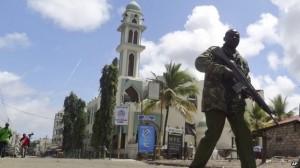Kenyan Government considers closing 2 Mosques to curb spread of Radicalism
 After a week of violent clashes triggered by the police’s allegedly wanton raid on a renowned mosque in Mombasa on Sunday Feb. 2nd, officials have disclosed that the Kenyan government is considering shutting down two mosques suspected of having links with al Shabab.
After a week of violent clashes triggered by the police’s allegedly wanton raid on a renowned mosque in Mombasa on Sunday Feb. 2nd, officials have disclosed that the Kenyan government is considering shutting down two mosques suspected of having links with al Shabab.
According to reports, officials suspect the two mosques–Masjib Musa and Masjib Sakina–are used to propagate radical islamic ideas and recruit young worshippers to become terrorists.
Nelson Marwa, Mombasa’s police commissioner, who confirmed reports that the government is mulling shutting down the places of worship, pointed out that “Closing the mosque may not be the solution but that will remain our final option.”
Pundits have underscored the fact that the government’s decision is likely to further increase tension in a nation already struggling to deal with the effects of religious extremism.
Local Muslim leaders have also voiced their disappointment at the government’s plan, which they say violates their basic right to freedom of worship.
In the past week, several notable Kenyan Muslims have lent their voices in dissent against the government’s raid on the Masjib Musa mosque on Sunday Feb. 2nd.
Police sources claim the raid followed reports that the place of worship was also being used to disseminate radical ideologies, as well as recruit and groom terrorists.
But critics say the police had been informed of a public meeting in the mosque on the day the raid occurred. Others have highlighted the fact the the officers violated Islamic law by venturing into the mosque with their shoes.
The general consensus among pundits seems to be that shutting down these places of worship will lead to increased radicalism in the country.
However, according to the National Intelligence Service (NIS) report which recommended closing the mosques, the move will be effected if certain conditions are not met.
Masoud Mwinyi, a spokesperson for Mombasa’s police says although “Shutting down the mosque was intensively deliberated during the week-long meetings attended by both county and national police commanders but we are also considering other avenues.”
Some pundits have suggested that the government investigates particular security threats rather than condemn an entire mosque.
Earlier in the week, local Muslim leaders warned that security forces risked estranging the country’s Muslim youths through their repressive, heavy-handed tactics.
Meanwhile, President Uhuru Kenyatta has revealed that the country’s security agencies will fight against the radicalization of places of worship.
“Under no circumstance will we allow places of worship, like I said, be it a Hindu temple, a Muslim mosque, be it a Christian church, to be used as a place to radicalize and to threaten the lives of Kenyans,” he said.
Clashes continue in Mombasa
Throughout the week, local media sources reported several instances of violent clashes between angry Muslim youth, the police and sometimes innocent civilians.
At least two people have been killed and three rushed to the hospital after being stabbed by mobs this past week.
These isolated scuffles reached a peak on Friday when over 30 young Muslims armed with machetes and other crude weapons took to the streets shortly after the Friday midday prayers.
Reports indicate police had to resort to tear gas and rubber bullets to disperse the group, who responded by throwing stones at the police.
Several shops have been reportedly looted and vandalised by the group of rioters who local police commissioner Julius Wanjohi described as “idlers out to steal from shop owners and residents.”
Local media sources say the group barricaded roads and indiscriminately attacked oncoming strangers.
According to one victim, “Some of them were chanting Islamic slogan and indiscriminately attacked innocent resident including women and children.”
Several reports on the incident have indicated the attacks were in retaliation for the raid on the Masjib Musa mosque.
But police commissioner Wanjohi insists Friday’s riots “have nothing to do with the ongoing chaos related to radicalization.”
County authorities have reportedly banned all public gatherings in Mombasa in an attempt to avert any more riots.
Meanwhile, the trial of the 104 people arrested during the raid on the Masjib Musa mosque has been postponed to next week Wednesday due to disagreements between the defense and prosecution.
The presiding Judge James Ombina reportedly referred the case to another court following the defense lawyers’ claim that he was being intimidated and that the court is biased.
During the week, a High Court ordered the police to release about 21 women and children among those arrested during the raid on the Masjib Musa mosque.
Photo by AP: A security officer stands outside the Masjib Musa mosque, Mombasa.